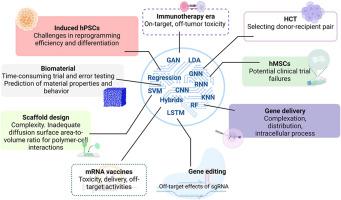基于人工智能的解决方案,应对再生医学当前面临的挑战。
IF 4.7
3区 医学
Q1 PHARMACOLOGY & PHARMACY
引用次数: 0
摘要
人工智能(AI)的出现及其在再生医学中的应用是一个重大机遇,有望解决关键挑战并改善治疗效果。本文探讨了人工智能(包括机器学习和数据融合技术)如何促进再生医学,特别是基因治疗、干细胞治疗和组织工程。在基因治疗方面,人工智能工具可以通过分析大量基因组数据集,以精确的方式靶向和修改遗传物质,从而提高治疗的准确性和安全性。在细胞疗法中,人工智能通过预测间充质干细胞(MSCs)的功能和效力,改进了细胞产品(如间充质干细胞)的表征和优化。此外,人工智能还能增强先进的显微镜技术,对活细胞培养进行精确、无创和定量分析。人工智能通过优化生物材料和支架设计、预测与组织的相互作用以及简化开发流程,增强了组织工程学。这可以减少试验和错误,从而实现更快、更具成本效益的创新。人工智能与再生医学的融合蕴含着巨大的变革潜力,有望带来有效的治疗方法和创新的治疗策略。这篇综述强调了跨学科合作和持续整合基于人工智能的技术(如数据融合方法)对于克服当前挑战和推动再生医学发展的重要性。本文章由计算机程序翻译,如有差异,请以英文原文为准。

AI-Based solutions for current challenges in regenerative medicine
The emergence of Artificial Intelligence (AI) and its usage in regenerative medicine represents a significant opportunity that holds the promise of tackling critical challenges and improving therapeutic outcomes. This article examines the ways in which AI, including machine learning and data fusion techniques, can contribute to regenerative medicine, particularly in gene therapy, stem cell therapy, and tissue engineering. In gene therapy, AI tools can boost the accuracy and safety of treatments by analyzing extensive genomic datasets to target and modify genetic material in a precise manner. In cell therapy, AI improves the characterization and optimization of cell products like mesenchymal stem cells (MSCs) by predicting their function and potency. Additionally, AI enhances advanced microscopy techniques, enabling accurate, non-invasive and quantitative analyses of live cell cultures. AI enhances tissue engineering by optimizing biomaterial and scaffold designs, predicting interactions with tissues, and streamlining development. This leads to faster and more cost-effective innovations by decreasing trial and error. The convergence of AI and regenerative medicine holds great transformative potential, promising effective treatments and innovative therapeutic strategies. This review highlights the importance of interdisciplinary collaboration and the continued integration of AI-based technologies, such as data fusion methods, to overcome current challenges and advance regenerative medicine.
求助全文
通过发布文献求助,成功后即可免费获取论文全文。
去求助
来源期刊
CiteScore
9.00
自引率
0.00%
发文量
572
审稿时长
34 days
期刊介绍:
The European Journal of Pharmacology publishes research papers covering all aspects of experimental pharmacology with focus on the mechanism of action of structurally identified compounds affecting biological systems.
The scope includes:
Behavioural pharmacology
Neuropharmacology and analgesia
Cardiovascular pharmacology
Pulmonary, gastrointestinal and urogenital pharmacology
Endocrine pharmacology
Immunopharmacology and inflammation
Molecular and cellular pharmacology
Regenerative pharmacology
Biologicals and biotherapeutics
Translational pharmacology
Nutriceutical pharmacology.

 求助内容:
求助内容: 应助结果提醒方式:
应助结果提醒方式:


